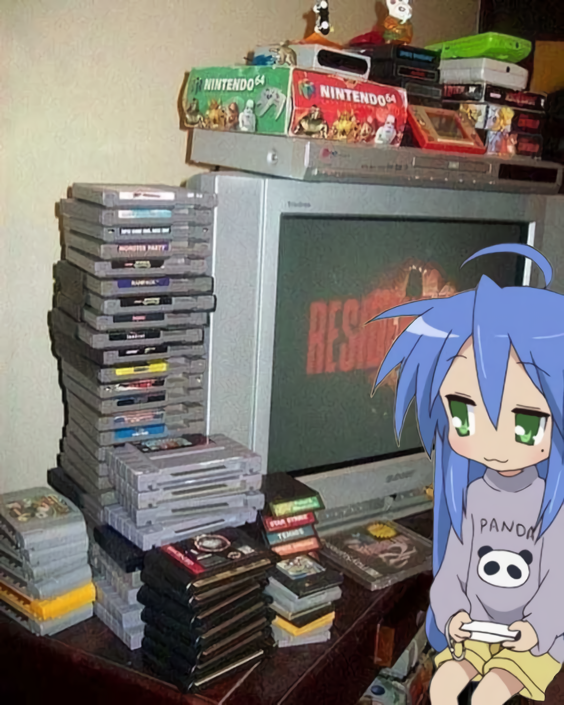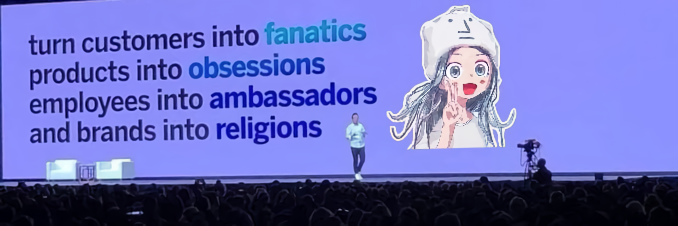For some time in the last couple of years, there has been a crescent discontent with the state of the entertainment industry, most notably video games and movies. From bug-filled releases to bad CGI, from bad sequels, prequels, remakes and remasters to the pandering and DEI… it does seem as if the industry leaders have a fetish for stifling innovation and take the lazy approach of over-promising and under-delivering instead of putting the effort into delivering good products with originality.
Given this bleak picture of today in stark contrast with the creative and innovative scene of yesterday, becoming disillusioned is natural. The attention one once gave to these art forms is redirected towards even more shallow forms of entertainment that not only fails to often deliver a significant message or reflection, but also aids in eliminating the faith in the existence of meaningful entertainment.
What most people in this wave of frustration miscalculate is the extent and the impact of this degradation, and how achievable the solutions can be. In this post, I will enumerate the main problems I observe concerning the perception of these issues. By criticizing each point, I offer some solutions I compile and apply myself to deal with this in an individual, actionable level. I will give more focus to video games in this post, but this can apply to other media as well.
 While you're out there complaining, I'll be here gaming.
While you're out there complaining, I'll be here gaming.
The Three Problems
Problem 1: Of advertisers and bubbles.
Many things were, are and will be created to take away your money without giving much in return. This is the end goal of hardcore capitalists, after all. What we can grasp for but a moment is the experiences they provide and how much value each experience has is up to the individual. This subjectivity is what makes this debate so hard.
Each of us is like a flame, irradiating knowledge and wisdom by burning away what time and energy we have left to live. The “life radiation” we emit brings warmth and lights the way for those around us, and it is fueled by our work and leisure. By sharing our experiences with others, we inspire them to burn brighter, seek their own experiences and, eventually, inspire others.
However, some people abuse this power. On one side, we have big publishers constantly promoting the next new shiny thing. A hype machine composed of different entities: the marketing departments of game studios releasing ambitious advertisement campaigns and journalists disseminating rumors, controversies and reviews. On the other side, we have the consumers who, consciously or not, bombard our feeds with constant exposure to the same shiny new thing, be it by reverberating the hype machine’s byproducts, be it by producing excessively positive or negative criticism of the product or its context, which can feel very tiresome the more you are exposed to them.
 The true goal of marketing.
The true goal of marketing.
One way or another, we are overexposed to the hype marketing that distorts our notion of value and hijacks our brains’ reward system. This induced hyperesthesia is even more severe if you are susceptible to targeted advertisement and/or if you happen to participate in a specific community. The latter poses an extra problem, for many people take advantage of others by their common tastes to gradually perpetrate some narrative or belief system. The great danger of internet bubbles is that instead of inspiring, they alienate.
When different bubbles come into contact, they get reinforced. Each one erects a totem of the other to be ostracized. This leads to a feedback loop in which members of each bubble constantly attack the others’ totem while never really providing valid criticism and instead resort to fallacies to sustain their claims. Even worse, they play victim while openly harassing the opposition.
Coming back to our flame metaphor, it’s as if the hype machine and the internet bubbles are an uncontrollable wildfire that is fueled by passion, drama and hate. It suffocates our flames and destroys all the joy of gaming we had left. What remains after is just cold ashes in a dark, barren land.
What once was the means of assessing the quality of a product has become an instrument of polarization. Either something is the best or the worst thing ever, depending on who you ask. This is why it is so important for us to break the barriers and be open to different perspectives, as well as to question how people (including ourselves) come to their conclusions and what are their biases and interests. Once more, exercise critical thinking.
As for managing the hype and FOMO, here’s a very good piece of advice: NEVER buy games at launch and ALWAYS wait for updates or discounts. Since video games are often released in early access or in an overall unfinished state, the experience of someone playing after the first year or so should be better and cheaper. Reducing one’s presence online can make this task much easier to achieve.
The key takeaway is to refrain from constantly engaging in meaningless discussions online and save that energy to enjoy what matters.
Problem 2: Of entertainment density and frequency.
Many things were, are and will be created to take away your time without giving much in return. We live very busy lives. We wake up, eat, work, sleep and repeat. There’s barely enough time there for having fun. So, why waste this time on passive, low density and mind-numbing pleasures? Why do we spend so much time “doom scrolling” when we could use this time to play video games or read books?
Our modern lifestyle leads us to live constantly in autopilot. We are required to be always available, always achieving something. When downtime comes, we can’t engage in active, high density and mind-enticing pleasures because we can’t slack off for long, we must go back to work soon. Fun is forbidden!
Then, we become desensitized to the simple things and accustomed to instant small doses of “fun”. On the surface, these types of entertainment seem inoffensive, given their small dosage. However, when combined for long periods of time and delivered by an algorithm designed to keep you scrolling for as much time as possible, their compound effect is hours wasted on the irrelevant.
To use the metaphor once more, it’s as if these activities slowly drain our flames, lowering their temperatures and attenuating their emissions, leading to less colorful and more dim lights that eventually fade away without inspiring any other flames to grow.
 :(
:(
The solution lies in the balance between stress and relief - work and leisure - and controlling the dosage of stimuli. Take a look at your routine and find your “time sinks”. Spend a lot of time locked inside bubbles or eternally watching dumb videos? Cut that crap! Checking work notifications past work hours? Get out of there! After that, you will notice how much time you have available. You can fill those newly-found time gaps with more engaging activities.
When time comes to stop working and start playing, embrace it mindfully. Turn of notifications and avoid any other disturbances. Have 5 to 15-minute breaks every 45-55 to stretch your limbs, drink water and go to the bathroom if needed. You will realize how much attention you were giving away for free.
Thus, it becomes a cycle. After work, give yourself a break to have fun and play some games. After play, feel rewarded and motivated to do some work the next day. It comes naturally, and you will feel compelled to fall into this cycle after a few iterations. That’s a good habit being formed right there.
Lastly, be aware that some games also present the same dopamine-hacking mechanisms to keep you playing (and, more importantly, spending) for much longer than what’s considered healthy. I personally keep myself as far away as possible from these games, for the benefit they promise can usually be found somewhere else less addictive.
Problem 3: Of choice paralysis.
One very important problem that is left largely unaddressed is: what to play? How and where to find good games to play? If most modern releases are terrible, then there’s not much hope left, right?
Well, let’s start with the games you already own accumulating dust in your Steam library, or your Epic Games “free game of the week” dump, or your totally legal ROM archive. Add to that over half a century of gaming history on multiple platforms, with some of them available to purchase first hand and many others on the second hand market. And that’s not accounting for unofficial fan-made games, ROM hacks and mods, and the potentially good games yet to be released…!
Calm now, don’t panic. We all have a huge backlog of games, and that’s OK. This is why curatorship is essential, albeit subjective. Also keep in mind that not every game will appeal to you, that not playing some game despite their supposed critical acclaim is perfectly fine, and that you can’t play everything.
Start by making a two-column list of the games you have already played at some point of your life on one side and the games you never played but wish to on another side. See if they match in number and in proportion. That will give you an indication of you media literacy and help you identify the series and genres you know and love and the ones you have to still discover.
Afterwards, based on that list, seek game recommendations from friends, family members and others with similar tastes. Maybe they can introduce you to new subgenres you didn’t even know you liked. Always use your critical sense to analyze if they are valid and align with your tastes. Once again: seek inspiration, not alienation.
Once you have some suggestions, compare them to your current state of mind and listen to your “inner hype”. Maybe you can associate different times of the year with different games, like playing survival horror on October or JRPGs in the summer. This will create anticipation for these seasons and solidify affectionate memories, therefore reinforcing the habit of gaming in your life.
It’s also important to evaluate your exploit/explore trade-offs, that is, if it’s more worth to keep playing a certain game or if it’s better to switch to another one. For that, there is the spiral algorithm, first introduced to me by Cogumelando (in Portuguese).
The spiral algorithm works as follows: start with a list of the best games of a certain genre for a certain console. Then, pick some of them that aligns with your current inner hype and play them for a couple of hours whenever you can or feel like. Keep that cycle until either you beat the game, or the game beats you. If the former happens (great!), add that game to a second list of games you’ve beaten. Else, just drop it and go to the next one on the list. This way, you’re spiraling out from the more known classics to the hidden treasures.
It’s possible (and very common, btw) that you enjoy games you’ve never beaten, and that’s also OK. Maybe you got tired of the game or lacked the skill and tricks to finish it. No shame in that. Heck, if anything, it might give you an excuse to play it again in the future and make it to the end.
Personally, I have been having a blast exploring retro titles. The good thing about living in 2024 is that we have working emulators for consoles ranging from the Magnavox Odyssey to the PlayStation 3. So lately I downloaded and configured some of them to both revisit games I played growing up and play those I never got the chance to experience.
With the amount of resources and knowledge available nowadays at mere clicks away, it’s easier than ever to keep alive video game culture and preserve it for current and next generations. So let’s do our part to keep our flames burning bright and lighting other fires along the way.
 Use emulation. It's delicious.
Use emulation. It's delicious.
TL;DR:
- Never let the entertainment industry diminish the accomplishments of the past, nor the bad apples of gaming community ruin your fun.
- Never let your self-indulgence nor pointless distractions prevent you from appreciating the moment and possibly sharing it with others.
- And even though you can’t play/watch/read/listen to everything everyone has ever created, never let that stop you from learning to enjoy what matters.